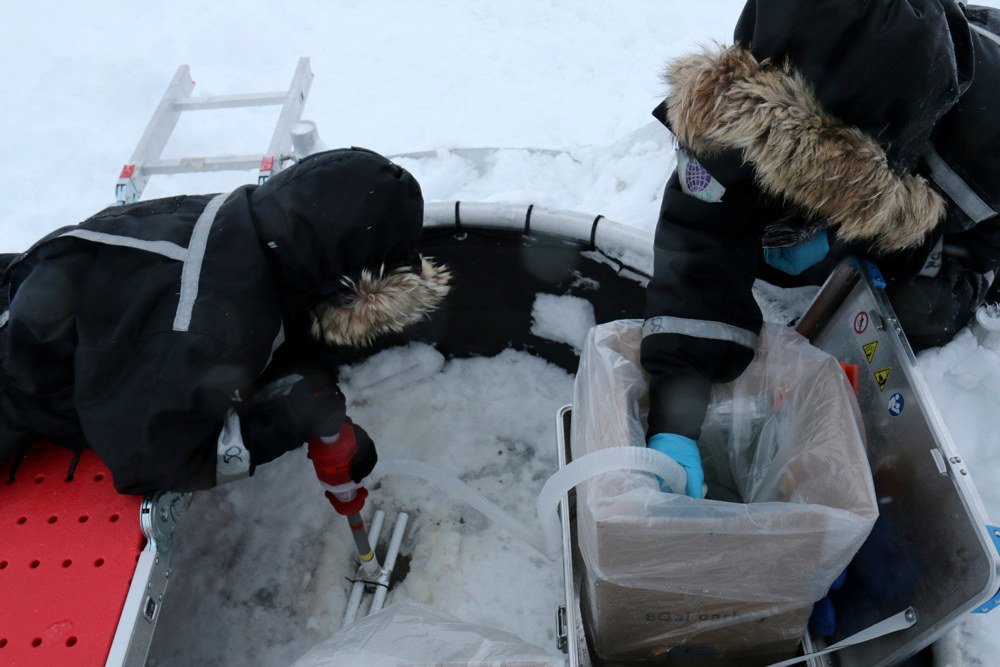Oil spills more catastrophic to Arctic ecosystems than expected, new study shows
09.11.2018
A COWI industrial PhD project has revealed that the long-term exposure from oil spills in the Arctic could be much more damaging to pelagic ecosystems than previously thought.
The area north of the Arctic Circle may contain around 30% of the world’s undiscovered gas and 13% of the world’s unexplored oil reserves.
However, the potential risks related to exploiting them may be greater than expected.
In a research paper recently published in the prestigious American Journal of Environmental Science & Technology, PhD student Kirstine Underbjerg Toxværd explains how a winter oil spill from the exploitation of abundant fossil fuel resources could induce potential stress on Arctic pelagic ecosystems.
Whereas previous studies were only able to show short-term toxicity stress, this project focused on the delayed effects and aimed to fill in some of the existing knowledge gaps needed to improve environmental risk assessments.
Survival, reproduction, feeding and energy storage affected
The key findings show that when two of the most important zooplankton species in Arctic ecosystems are exposed to an oil spill during hibernation:
- Copepods tend to accumulate oil compounds during long-term exposure in lipid reserves, which have detrimental effects.
- There were strong delayed effects in energy recovery, and food uptake and egg production were at least 10 times lower than previously documented
- Survival and reproductive output were affected, including second-generation deformation effects on offspring, which could result in profound impacts on the population and thereby on the entire Arctic marine food web
- Half of the copepod species Calanus glacialis in the experiment died when exposed to doses of pyrene from crude oil 300 times smaller than what was expected.
The research on the effects from response technologies also showed that during the ice-covered period, these pelagic communities were more vulnerable when a chemical dispersant was used to treat an oil spill, and less vulnerable when treated with in situ burning.

Further research needed
Morten Hjorth, PhD Supervisor and COWI Chief Specialist, explains that as long as there's still demand for oil and gas from society, there will still be explorations into new areas rich in fossil fuels, and therefore a need for further research on this topic:
"With oil prices rising again, and in spite of the gradual shift towards a greener agenda, I think the industry will begin to open new routes into the Arctic, especially now with global warming causing the ice to melt and making it physically a much more accessible region," said Morten.
"Oil fields in Europe are old and it's becoming more and more costly to draw out of these, so companies are looking elsewhere. Also, countries like Greenland are still very interested in exploring the economic possibilities of fossil fuels in the Arctic."
While ongoing decline in polar sea ice threatens Arctic ecosystems, it simultaneously improves the prospect of exploiting the abundant fossil fuel resources in the seafloor.
"I hope that some of the research we've done will show what a complex and unique environment the Arctic is, and that more research needs to be done to accurately assess the potential risks. My hope is that the appropriate authorities will take notice and set standards for what is required before resources in the Arctic are exploited," said Morten Hjorth.
Facts
Project name:
"Effects of oil spills on Arctic marine ecosystems – Winter exposure and variations in sensitivity"
PERIOD:
2014 - 2018
Supervisors:
Morten Hjorth (COWI) and Torkel Gissel Nielsen (DTU Aqua)
Funded by:
The IOGP, COWIfonden and Innovationsfonden
Get in contact

Morten Hjorth
Chief Specialist
Water and Nature, Denmark
Tel:
+45 56 40 00 00
morh@cowi.com